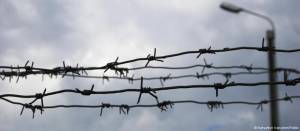Detention Unit film and its possible ramifications

The investigation carried out by TVi journalist Kostyantin Usov: “Lukyanivka. Prison No. 1” gained a lot of publicity and has, over recently days, led to many contradictory reports. On Monday there was considerable concern among journalists following reports that criminal proceedings might be initiated against Usov. The Prosecutor General’s Office denied any plans to do so. Whether this was because there were no such plans, or because they were shelved after arousing so much attention is not clear. On Tuesday it was announced that the Acting Head of the Lukyanivsk SIZO [Detention centre] where Yulia Tymoshenko was held until the end of December last year, and where Yury Lutsenko and others are still being held had been removed from his post.
The film shows the SIZO in detail: the walls covered with dangerous mould; food gone off; the negligent attitude of doctors as the conditions of life in a place where most people are being held without having been convicted of any crime.
Usov shows how the only way of improving your conditions is through illegal means. For 400 UAH a remand prisoner can get a phone brought in; for 300 dollars – a prostitute. For a much larger amount you can get moved to better conditions.
The film got a lot of interest and within a few days had been watched on YouTube by over 100 thousand people. The viewers were sharply divided as to whether the film could help improve conditions, or whether prisoners’ lives there would become harder.
Although the Prosecutor has promised to investigate the facts cited in the video, there were also reports, as mentioned, suggesting that Usov might face prosecution.
Kostyantin Usov himself told the Deutsche Welle Ukrainian Service that after the film was broadcast, a number of the prisoners whom he knew were called in for questioning by the SIZO Administration. “They promised these people incredible improvement in conditions in exchange for any information about who I am talking with, who my sources are and what I know”. He stresses that he is able to defend himself, and is concerned for those who are now in the SIZO.
It was no accident that he chose the Lukyanivsk SIZO. He explains that there is constantly information about unlawful things going on there. Not to mention the fact that since 2010 it has become known throughout the world as the place where former government officials, particularly Yulia Tymoshenko and Yury Lutsenko have or are being held.
His investigation lasted a year. Before making contact with a person, he needed to do some investigations so as to know who he was dealing with. He says that he only spoke with people who are remanded in custody in his view unwarrantedly.
One of the most difficult tasks was to gain the trust of the remand prisoners. Usov says that he maintains contact with around 100 people held in the SIZO. On the other hand, only one person of the 10-15 whom he turned to for help, agreed. “To convince somebody that you need to rise up and go against the system, dare to get video footage of things that are unlawful and pass on those files to people at liberty is even harder. After all, a person held in Lukyanivka is under the total control of officers and guards. In each cell there are people who are collaborating with the Administration, people who represent the professional criminal world. And he also has an interest in things in the SIZO being peaceful and stable”.
In spite of the promises from the Prosecutor to carry out their own investigation over the conditions in the Kyiv SIZO, Kostyantin Usov does not believe there’s any point in expecting radical change. They did not, after all, hear anything they didn’t know before.
This view is shared by Dmytro Groisman, Coordinator of the Vinnytsa Human Rights Group. He says that the Prosecutor’s Office will not be busy in investigating how Usov learned about it all, rather than whether such information is correct. They get dozens of complaints everyday from people in SIZO, he says, they just don’t react to them. Groisman stresses that public scrutiny is vital of what is going on in SIZO. He says that this can be parliamentary investigations, or the creation of a joint commission with representatives of the Prosecutor General’s Office, Verkhovna Rada, Ombudsperson and Health Ministry. This commission he believes needs to decide whether the Lukyanivsk SIZO can function at all, or whether it needs to be closed down. He says that in principle it should be closed, with another built complying with proper standards outside the city. He believes it important that the film be translated and shown beyond Ukraine.
On the other hand, Heather McGill from Amnesty International watched the film at Deutsche Welle’s request and says that the information in it has long been known within her organization.
She notes that it is very easy to end up in SIZO since judges tend to use remand in custody as the main measure of restraint, ignoring others. Investigations into deaths in SIZO are neither quick enough to establish the real cause of death, nor carried out properly.
She says that at present Amnesty International’s attention is more focused on conditions in police cells.
From a report at http://dw.de/dw/article/0, , 15867850, 00.html





